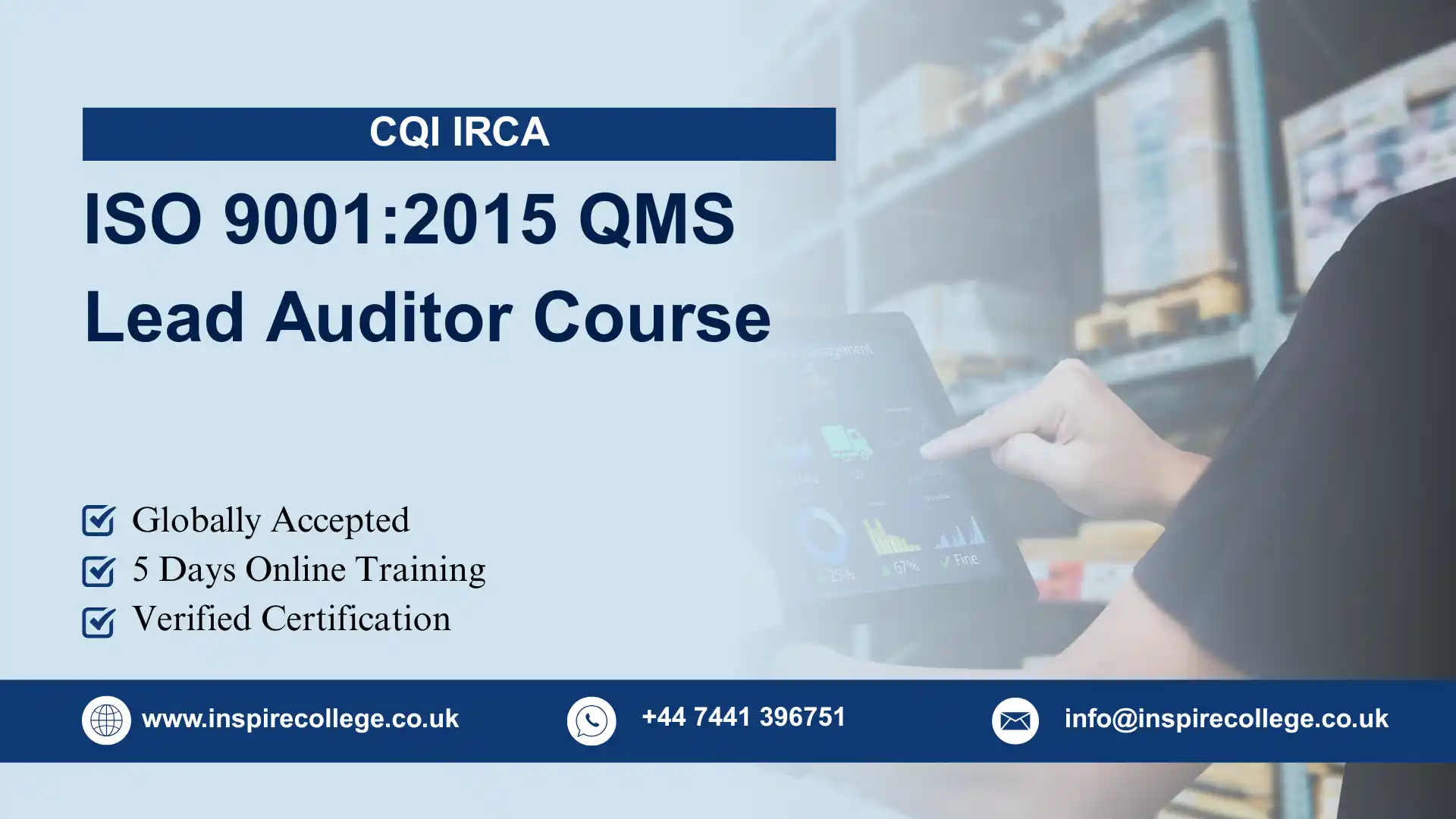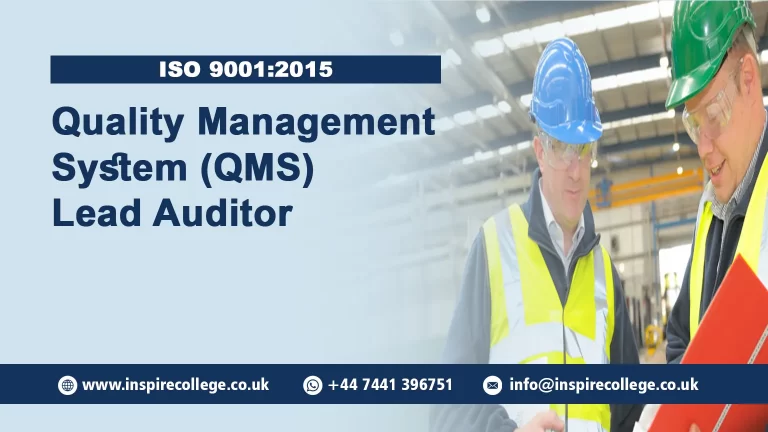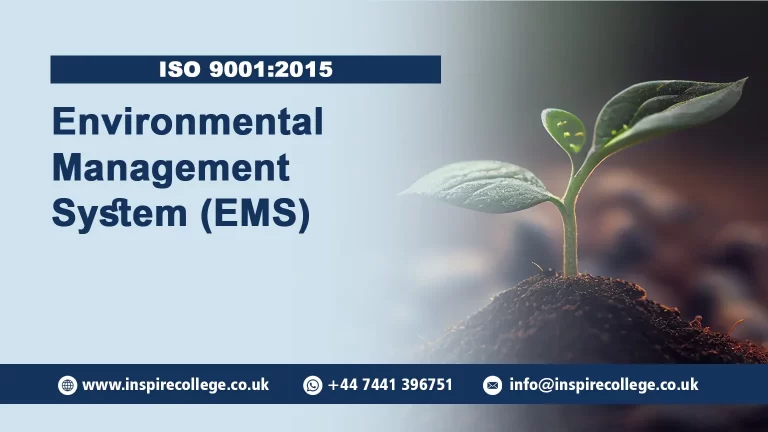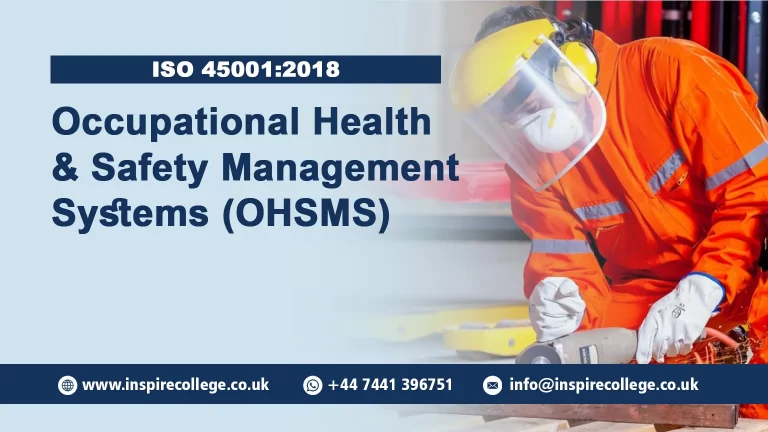
CQI IRCA ISO 9001:2015 QMS Lead Auditor Course
In today’s competitive and quality-driven global market, organizations seek professionals who not only understand quality management systems (QMS) but can also lead audits that drive continuous improvement. If you’re aiming to enhance your career in quality assurance or auditing, the CQI IRCA ISO 9001:2015 QMS Lead Auditor Course is a game-changer.
This internationally recognized training program is certified by CQI (Chartered Quality Institute) and IRCA (International Register of Certificated Auditors). It’s designed for individuals who want to develop the knowledge and skills to plan, conduct, report, and follow up on audits of quality management systems against ISO 9001:2015, in accordance with ISO 19011 and ISO/IEC 17021, where appropriate.
Completing the CQI IRCA Lead Auditor Course boosts your employability and opens doors to senior roles in quality assurance, compliance, auditing, and consultancy. It’s especially valuable for those working in manufacturing, engineering, healthcare, construction, and service industries.
The CQI IRCA ISO 9001:2015 QMS Lead Auditor Course is more than just a certification—it’s an investment in your professional credibility and a powerful asset in your journey toward quality excellence. Whether you’re auditing your own company or working as an external auditor, this course equips you with the skills to lead with confidence and integrity.
To enrol in CQI IRCA ISO 9001:2015 QMS Lead Auditor Course the applicants are expected to meet the following criteria:
Minimum Age
- Candidates must be at least 18 years old at the time of enrollment.
Educational Background
- A minimum of a secondary school education (high school diploma or equivalent) is required.
- Candidates should possess a good level of general education to support comprehension of technical material and participation in discussions and written assessments.
Professional Experience
- It is recommended (though not mandatory) that candidates have at least one year of work experience in a relevant role.
- Ideal backgrounds include experience in:
- Quality assurance or quality control
- Internal or supplier auditing
- Process improvement or compliance
- Operational or technical roles within industries that utilize management systems
English Language Competency
- As the course is delivered and assessed in English, candidates must have sufficient proficiency in English, including:
- Reading: Ability to understand technical standards and guidance documents
- Writing: Ability to complete written assignments and the final examination
- Speaking and Listening: Ability to participate actively in group discussions, presentations, and audit role-plays
Mandatory Units
The CQI IRCA ISO 9001:2015 QMS Lead Auditor Course Consist of following core units.
Mandatory Units
- Introduction to Quality Management Systems (QMS) and ISO 9001:2015
- ISO 9001:2015 Requirements
- Fundamentals of Auditing and ISO 19011 Guidelines
- Audit Planning and Preparation
- Conducting the Audit – On-site Activities
- Audit Reporting and Follow-Up
- Leading an Audit Team
Here are the learning outcomes for each study unit:
1. Introduction to Quality Management Systems (QMS) and ISO 9001:2015
Learning Outcomes:
- Explain the purpose, scope, and benefits of a Quality Management System (QMS).
- Describe the key concepts and principles of quality management, including the PDCA cycle.
- Understand the structure and intent of ISO 9001:2015.
- Identify the importance of customer focus, leadership, and continual improvement in a QMS.
- Recognize the context of an organization and the role of interested parties in quality management.
2. ISO 9001:2015 Requirements
Learning Outcomes:
- Interpret the requirements of ISO 9001:2015 clauses 4 to 10.
- Understand how organizations implement these requirements to achieve quality objectives.
- Explain how documented information supports conformity and effective QMS operation.
- Assess how ISO 9001 requirements support risk-based thinking and process management.
- Relate standard requirements to real-world operational and business contexts.
3. Fundamentals of Auditing and ISO 19011 Guidelines
Learning Outcomes:
- Describe the purpose, types, and principles of auditing.
- Understand the structure and content of ISO 19011:2018 (Guidelines for auditing management systems).
- Identify auditor responsibilities, ethical behavior, and audit evidence requirements.
- Differentiate between first-party (internal), second-party (supplier), and third-party (certification) audits.
- Recognize the role of ISO/IEC 17021 in the certification process.
4. Audit Planning and Preparation
Learning Outcomes:
- Develop a comprehensive audit plan aligned with audit scope, objectives, and criteria.
- Conduct a document review to assess QMS readiness for audit.
- Prepare effective audit checklists and allocate roles within an audit team.
- Determine audit resources, timings, and communication protocols.
- Understand how to manage audit risks and logistics in advance of on-site activities.
5. Conducting the Audit – On-site Activities
Learning Outcomes:
- Conduct opening meetings and establish rapport with auditees.
- Use effective communication and interviewing techniques during audit activities.
- Collect and verify objective evidence through observation, questioning, and document review.
- Record audit findings in a structured and factual manner.
- Maintain professionalism and manage challenging behavior during audits.
6. Audit Reporting and Follow-Up
Learning Outcomes:
- Classify audit findings (nonconformities, observations, opportunities for improvement).
- Write clear, concise, and evidence-based nonconformity reports.
- Prepare comprehensive audit reports that meet organizational and standard requirements.
- Conduct effective closing meetings with auditees and stakeholders.
- Understand the follow-up process, including corrective action review and verification.
7. Leading an Audit Team
Learning Outcomes:
- Explain the responsibilities and attributes of a lead auditor.
- Assign tasks and provide direction to audit team members effectively.
- Facilitate team meetings and ensure consistent evaluation of evidence.
- Resolve conflicts and manage time, resources, and expectations during audits.
- Demonstrate leadership skills in multi-auditor and multi-site audit scenarios.
The CQI IRCA ISO 9001:2015 QMS Lead Auditor Course is designed for professionals who want to gain the skills and certification necessary to audit Quality Management Systems (QMS) against the ISO 9001:2015 standard. This course is suitable for:
Aspiring Lead Auditors
- Individuals who wish to become certified third-party (external) auditors for ISO 9001:2015.
- Professionals preparing to register with CQI IRCA as certified auditors.
Internal and Supplier Auditors
- Personnel conducting internal audits within their organization.
- Auditors responsible for performing second-party (supplier) audits.
Quality Assurance and Compliance Professionals
- QA/QC managers, officers, and engineers seeking a thorough understanding of ISO 9001:2015 auditing practices.
- Staff responsible for managing compliance, process control, and quality improvement activities.
Consultants and Management System Advisors
- Consultants involved in the implementation and maintenance of ISO 9001:2015.
- Advisors looking to enhance their credibility with an internationally recognized qualification.
Operational and Technical Managers
- Managers and team leaders responsible for maintaining and improving quality standards within their departments.
- Supervisors who manage teams or functions subject to QMS audits.
Career Changers and Graduates
- Professionals transitioning into quality management, auditing, or compliance roles.
- Graduates with relevant academic backgrounds seeking a career in quality assurance or auditing.
This course is ideal for anyone involved in planning, conducting, or leading audits of quality management systems and is especially valuable for those seeking a formal qualification recognized worldwide.
Register Now
FAQs for CQI IRCA ISO 9001:2015 QMS Lead Auditor Course





